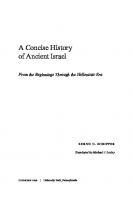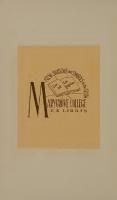A History of Ancient Greek: From the Beginnings to Late Antiquity 9780521833073, 0521833078
Publisher description
533 71 27MB
English Pages 1661 [1660] Year 2007
Table of contents :
Front Matter
Front Cover
Coyright
Contents
List of figures
List of maps
Acknowledgements
List of contributors
Preface
Foreword to the Greek edition
Editor's note
Editor's note to the Greek edition
Production team for the Greek edition
List of abbreviations
General Introduction: Histories of the Greek Language
PART I THE LANGUAGE PHENOMENON
1 The nature of language
2 Units-levels of linguistic analysis
3 Language and the brain
4 Language and thought
5 The genesis of language
6 Tools and language
7 The acquisition of language
8 Language change
Bibliography
PART II THE GREEK LANGUAGE: LANGUAGE AND HISTORY
Introduction
1 The Indo-European language family: The linguistic evidence
2 The Indo-European language family: The historical question
3 Indo-European civilization
4 The genesis of Greek
5 Language and writing
6 Writing systems
7 Proto-history: The framework
8 Greek and pre-Greek languages: Introduction
9 Pre-Greek languages: Indirect evidence
10 Linear A
11 Cypro-Minoan scripts
12 The Cypriot syllabary
13 Eteocypriot
14 Eteocretan
15 Linear Β
16 The Dark Ages: The archaeological evidence
17 The introduction of the alphabet
18 History of the alphabet: Some guidelines for avoiding oversimplification
19 The archaic period
20 The classical period
21 Greeks and "barbarians"
22 Literacy and orality in the classical period
23 The Hellenistic period
24 The rise of Koine
25 The Greek world during the Roman empire
Bibliography
PART III THE ANCIENT GREEK DIALECTS
Introduction
1 The classification of the ancient Greek dialects
2 Mycenaean Greek
3 Ionic and Attic
4 Arcado-Cypriot
5 Pamphylian
6 The position of the Macedonian dialect
7 The Doric dialects
8 The Aeolic dialects
9 The language of Homer
10 The decline of the ancient dialects
11 A modern approach to the ancient Greek dialects
Bibliography
PART IV ANCIENT GREEK: STRUCTURE AND CHANGE
Introduction
1 The phonology of Classical Greek
2 The pronunciation of Ancient Greek: Evidence and hypotheses
3 The pronunciation of Classical Greek
4 The morphology of Classical Greek
5 The syntax of Classical Greek
6 Development in pronunciation during the Hellenistic period
7 Morphology: From Classical Greek to the Koine
8 Syntax: From Classical Greek to the Koine
9 Eastern Koines
10 Jewish Greek
11 The Greek of the New Testament
12 General characteristics of the ancient Greek vocabulary
13 Semantic change
14 Ancient Greek personal names
15 Early movement towards Modern Greek
Bibliography
PART V GREEK IN CONTACT WITH OTHER LANGUAGES
Introduction
1 Greek and Semitic languages: Early contacts
2 Greek and Thracian
3 Greek and Illyrian
4 Greek and Phrygian
5 Greek and Carian
6 Greek and Lycian
7 Greek and Lydian
8 Greek and Iranian
9 Greek and Etruscan
10 Greek and Latin
11 Greek and Latin: Evidence from the modern Greek dialects
12 Greek influence on Hebrew
13 Greek, Egyptian, and Coptic
14 Greek and Syriac
15 Greek and the Celtic languages
16 Greek and Indian languages
17 Greek and Arabic: Early contacts
Bibliography
PART VI TRANSLATION PRACTICES IN ANTIQUITY
Introduction
1 Translation in antiquity
2 The translation (Targum) of the Septuagint
3 The parallel use of Greek and Latin in the Greco-Roman world
4 The Greek of the Roman texts
5 The bilingualism of the Phoenicians in the ancient Greek world
6 Greek translation of Lycian
7 Translation: Greek and Syriac
Bibliography
PART VII LANGUAGE AND CULTURE
A Language and literature
Introduction
1 Language and literature
2 The use of the dialects in literature
3 Homer: Epic poetry and its characteristics
4 The use of language in ancient tragedy
5 The use of language in ancient comedy
6 Ancient Greek meter
7 The Hellenistic centuries: Language and literature
Β Special and specialized vocabularies
Introduction
1 The vocabulary of slavery
2 The vocabulary of democracy
3 The vocabulary of religion
4 The early Christian Greek vocabulary
5 The vocabulary of legal terms
6 Philosophical vocabulary
7 Medical vocabulary
C Cultural meanings and their transformations
Introduction
1 Ἑλληνισμός
2 Φιλοτιμία
3 Παράδεισος
4 Ἅγιος
5 Ψυχή
Bibliography
PART VIII THE ANCIENT GREEKS AND LANGUAGE
Introduction
1 Language and education in antiquity
2 The ancient grammarians
3 Atticism
Bibliography
PART IX THE FORTUNES OF ANCIENT GREEK
Introduction
1 The fortunes of Ancient Greek in the Middle Ages
2 Greek and the western Renaissance: Between humanism and heresy
3 From humanism to the Enlightenment: The teaching of Ancient Greek and its grammar
4 The teaching of (ancient) Greek grammar and the Modern Greek Enlightenment
5 The European encounter with vernacular Greek: The travelers
6 The pronunciation of Ancient Greek in modern times
7 Ancient, vernacular, and purist Greek language
8 "From Greek into our common language": Language and history in the making of Modern Greece
9 Language and translation
Bibliography
APPENDICES
Introduction
APPENDIX I
1 Accentuation
2 Punctuation
APPENDIX II
1 Proverbs - maxims and apophthegms - riddles - anecdotes - puns
2 The language of Greek katadesmoi and magical papyri
3 Early Greek letters on lead
4 Prophetic discourse
5 The language of the gods in Homer
6 Obscene language
7 The speech of the "barbarians" in Ancient Greek literature
8 Child talk in Ancient Greek literature
9 Non-verbal communication in antiquity
10 Ancient Greek music
APPENDIX III
1 Analogy and sound change in Ancient Greek
2 Ας: An example of syntactic change
3 The historical puzzle of the meaning "same": An example of semantic change
Bibliography
Editions and translations of ancient texts
Glossary
The IPA symbols
The development of the Greek phonetic system
INDICES
Index of proper names
Index of languages and dialects
Index of words per language/dialect
Index of terms and subjects
Front Matter
Front Cover
Coyright
Contents
List of figures
List of maps
Acknowledgements
List of contributors
Preface
Foreword to the Greek edition
Editor's note
Editor's note to the Greek edition
Production team for the Greek edition
List of abbreviations
General Introduction: Histories of the Greek Language
PART I THE LANGUAGE PHENOMENON
1 The nature of language
2 Units-levels of linguistic analysis
3 Language and the brain
4 Language and thought
5 The genesis of language
6 Tools and language
7 The acquisition of language
8 Language change
Bibliography
PART II THE GREEK LANGUAGE: LANGUAGE AND HISTORY
Introduction
1 The Indo-European language family: The linguistic evidence
2 The Indo-European language family: The historical question
3 Indo-European civilization
4 The genesis of Greek
5 Language and writing
6 Writing systems
7 Proto-history: The framework
8 Greek and pre-Greek languages: Introduction
9 Pre-Greek languages: Indirect evidence
10 Linear A
11 Cypro-Minoan scripts
12 The Cypriot syllabary
13 Eteocypriot
14 Eteocretan
15 Linear Β
16 The Dark Ages: The archaeological evidence
17 The introduction of the alphabet
18 History of the alphabet: Some guidelines for avoiding oversimplification
19 The archaic period
20 The classical period
21 Greeks and "barbarians"
22 Literacy and orality in the classical period
23 The Hellenistic period
24 The rise of Koine
25 The Greek world during the Roman empire
Bibliography
PART III THE ANCIENT GREEK DIALECTS
Introduction
1 The classification of the ancient Greek dialects
2 Mycenaean Greek
3 Ionic and Attic
4 Arcado-Cypriot
5 Pamphylian
6 The position of the Macedonian dialect
7 The Doric dialects
8 The Aeolic dialects
9 The language of Homer
10 The decline of the ancient dialects
11 A modern approach to the ancient Greek dialects
Bibliography
PART IV ANCIENT GREEK: STRUCTURE AND CHANGE
Introduction
1 The phonology of Classical Greek
2 The pronunciation of Ancient Greek: Evidence and hypotheses
3 The pronunciation of Classical Greek
4 The morphology of Classical Greek
5 The syntax of Classical Greek
6 Development in pronunciation during the Hellenistic period
7 Morphology: From Classical Greek to the Koine
8 Syntax: From Classical Greek to the Koine
9 Eastern Koines
10 Jewish Greek
11 The Greek of the New Testament
12 General characteristics of the ancient Greek vocabulary
13 Semantic change
14 Ancient Greek personal names
15 Early movement towards Modern Greek
Bibliography
PART V GREEK IN CONTACT WITH OTHER LANGUAGES
Introduction
1 Greek and Semitic languages: Early contacts
2 Greek and Thracian
3 Greek and Illyrian
4 Greek and Phrygian
5 Greek and Carian
6 Greek and Lycian
7 Greek and Lydian
8 Greek and Iranian
9 Greek and Etruscan
10 Greek and Latin
11 Greek and Latin: Evidence from the modern Greek dialects
12 Greek influence on Hebrew
13 Greek, Egyptian, and Coptic
14 Greek and Syriac
15 Greek and the Celtic languages
16 Greek and Indian languages
17 Greek and Arabic: Early contacts
Bibliography
PART VI TRANSLATION PRACTICES IN ANTIQUITY
Introduction
1 Translation in antiquity
2 The translation (Targum) of the Septuagint
3 The parallel use of Greek and Latin in the Greco-Roman world
4 The Greek of the Roman texts
5 The bilingualism of the Phoenicians in the ancient Greek world
6 Greek translation of Lycian
7 Translation: Greek and Syriac
Bibliography
PART VII LANGUAGE AND CULTURE
A Language and literature
Introduction
1 Language and literature
2 The use of the dialects in literature
3 Homer: Epic poetry and its characteristics
4 The use of language in ancient tragedy
5 The use of language in ancient comedy
6 Ancient Greek meter
7 The Hellenistic centuries: Language and literature
Β Special and specialized vocabularies
Introduction
1 The vocabulary of slavery
2 The vocabulary of democracy
3 The vocabulary of religion
4 The early Christian Greek vocabulary
5 The vocabulary of legal terms
6 Philosophical vocabulary
7 Medical vocabulary
C Cultural meanings and their transformations
Introduction
1 Ἑλληνισμός
2 Φιλοτιμία
3 Παράδεισος
4 Ἅγιος
5 Ψυχή
Bibliography
PART VIII THE ANCIENT GREEKS AND LANGUAGE
Introduction
1 Language and education in antiquity
2 The ancient grammarians
3 Atticism
Bibliography
PART IX THE FORTUNES OF ANCIENT GREEK
Introduction
1 The fortunes of Ancient Greek in the Middle Ages
2 Greek and the western Renaissance: Between humanism and heresy
3 From humanism to the Enlightenment: The teaching of Ancient Greek and its grammar
4 The teaching of (ancient) Greek grammar and the Modern Greek Enlightenment
5 The European encounter with vernacular Greek: The travelers
6 The pronunciation of Ancient Greek in modern times
7 Ancient, vernacular, and purist Greek language
8 "From Greek into our common language": Language and history in the making of Modern Greece
9 Language and translation
Bibliography
APPENDICES
Introduction
APPENDIX I
1 Accentuation
2 Punctuation
APPENDIX II
1 Proverbs - maxims and apophthegms - riddles - anecdotes - puns
2 The language of Greek katadesmoi and magical papyri
3 Early Greek letters on lead
4 Prophetic discourse
5 The language of the gods in Homer
6 Obscene language
7 The speech of the "barbarians" in Ancient Greek literature
8 Child talk in Ancient Greek literature
9 Non-verbal communication in antiquity
10 Ancient Greek music
APPENDIX III
1 Analogy and sound change in Ancient Greek
2 Ας: An example of syntactic change
3 The historical puzzle of the meaning "same": An example of semantic change
Bibliography
Editions and translations of ancient texts
Glossary
The IPA symbols
The development of the Greek phonetic system
INDICES
Index of proper names
Index of languages and dialects
Index of words per language/dialect
Index of terms and subjects

- Author / Uploaded
- A.-F. Christidis
- A.-Ph Christidēs
- Maria Arapopoulou
- Μαρία Χρίτη


![A History of the Bildungsroman : From Ancient Beginnings to Romanticism [1 ed.]
9781527516762](https://ebin.pub/img/200x200/a-history-of-the-bildungsroman-from-ancient-beginnings-to-romanticism-1nbsped-9781527516762.jpg)






